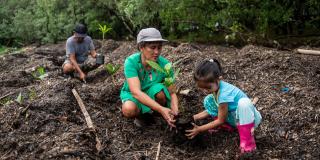
Over the last year, we have made a strategic shift in our livelihoods portfolio, deepening the focus on resilience by investing in ‘green’ skills and supporting a shift to agroecology or climate resilient farming. VSO agroecology volunteers and youth climate champions were integral to this change.
We reached almost 200,000 people through our resilient livelihoods programme.
As part of our achievement, over 181,000 marginalised people, primarily young people and women, enhanced their livelihoods capability.
Under the ACTIVE project, VSO continued to promote the voice and agency of primary actors. We strengthened our partnerships with key smallholder producer organisations including the Zimbabwe Smallholder Organic Farmers Forum, and the National Farmers Group Federation in Nepal. Youth engagement continues to be a central pillar of our livelihoods work.
Supporting young entrepreneurs
The Futuremakers project funded by the Standard Chartered Foundation has supported the livelihoods of young women and visually impaired young people to build their employability and entrepreneurship skills across three countries – Uganda, Tanzania, and Zambia. As Alfred Wamani, a visually impaired young man from Uganda explains:
“In 2020, I became blind and in the same year my teaching career and marriage ended. I joined the Uganda National Association of the Blind, while there I learnt about the Futuremakers project. I joined the saving scheme – Village Savings and Loan Association, which was mostly constituted of people with disabilities, and I became chairperson of the group. The money I have been borrowing from the group has sustained my small retail business and helped me provide basic needs for my family. My group was fortunate to receive business start-up kits to start a salon and laundry shop. The salon is up and running with one visually impaired employee. We earn 300,000 shillings per month.”
Addressing changes in social norms and inclusion is central to the Futuremakers programme. This project has supported over 1,400 young people and youth with disabilities to acquire entrepreneurship skills and start their own business or secure employment. Reflecting on the transformative changes at the training institute, Ndonio Francis, Principal of Samfya Youth Resource Centre, one of VSO’s partners in the Futuremakers programme in Zambia commented:
“When the students joined the course, they tended to be shy and hesitant, now they are vocal in their expression ... earlier, students – boys and girls – used to sit separately, but as the training progressed, they moved to mixed seating and collaborated with each other … there is increased respect for and collaboration with persons with disability by fellow trainees, and that has built a good rapport among all students.”
Promoting resilience in Nepal
The Promoting Inclusive Resilience and Accountability through Youth Association Strengthening project funded by the European Union was implemented in four municipalities (Local Level Government) of Karnali and Madhesh Province in Nepal. Over 50,000 primary actors were reached directly, and close to 1.6 million indirectly.
VSO worked closely with the Lekhbesi Municipality in Surkhet district Nepal to finalise its “Local Disaster and Climate Resilience Plan”. We also supported the establishment of youth targeted Climate Change Learning Centres in four municipalities. Through training and awareness raising, these have strengthened the learning and engagement platforms on climate actions for children, eco-club members, youth, and local government representatives.
VSO supported youth-led CSOs to develop their organisational advocacy and positioning on climate advocacy. This positioning on climate leadership helps youth-led organisations to increase their engagement in the local government's planning and budgeting process and there is evidence that local governments have prioritised climate action and increased their annual budget as a result.
Using technology to secure employment
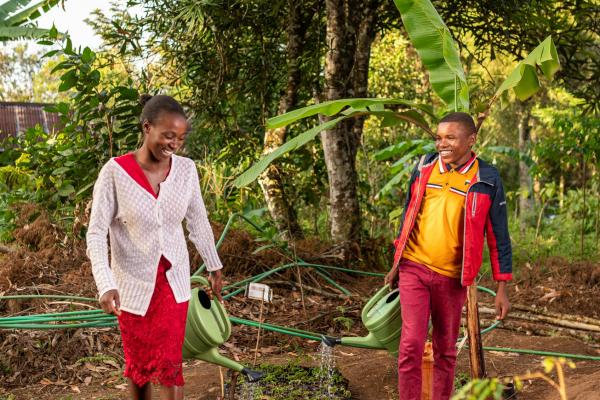
VSO has been at the forefront of thinking on future employment for young people in the countries where we work. As part of the Dutch government-funded Challenge Fund for Youth Employment (CFYE), VSO youth champions in Kenya have been leading research to understand the Future of Work and particularly the whole area of digitally enabled jobs.
Technology has the potential to open new professions and career paths for young people around the world that did not exist in the past. It also can break down traditional barriers that prohibit access for young people, particularly women.
Under the CFYE project, VSO youth champions have been involved in bringing a youth perspective into the design of Jobtech Learning Labs. These aim to understand, improve and make digitally enabled jobs more inclusive. VSO returned volunteers and experts participated in the development of the CFYE “Future of Economies” Podcast Series.
In Bangladesh, young community volunteers have been supporting farmers to improve their livelihoods by investing in climate resilient farming. VSO has focused particularly on women farmers, supporting financial inclusion through access to banking services. Our work has supported government agricultural extension officers to organise extension clinics at the field level every month where farmers can present their progress and problems directly to government officers. This makes interventions more sustainable as well as ensuring the state is accountable to farmers.
Youth community volunteers are engaging young entrepreneurs to collect vegetables from farmers' fields and send them on to sales centres with appropriate grading and quality, so there is zero waste of vegetables in the field and in the markets.
Building resilience against climate disaster
Over the past year, alongside education and health providers, VSO volunteers collaborated with communities on the frontline of climate crises to apply VSO’s volunteer-led resilience process. This process supports locally led responses to climate change through community risk assessment and action planning. It also identifies the wider systemic changes that help communities and local authorities adapt to the impacts they face from climate change.
VSO volunteers have been training climate specialists as well as youth volunteers to work alongside community representatives, local government and education and health providers before a crisis happens. They identify and address vulnerabilities within communities, as well as support responses when disasters occur. VSO has developed a digital dashboard to support our volunteers and stakeholders to evidence climate impacts, identify resilience-building priorities and to monitor new risks and actions.
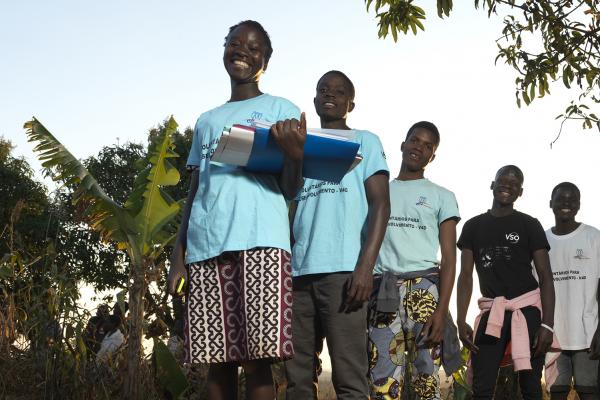
Following major flooding in Nigeria, VSO led a team of 10 volunteers to evidence the loss and damage incurred by over 1,000 households, and to identify priority areas of support. The results were digitised and submitted to provincial disaster response agencies to support the design of their response. VSO volunteers worked with affected communities to develop climate resilience plans and to establish drainage systems to reduce vulnerability to future floods.
Climate resilience plans were developed in Zimbabwe and Mozambique, where volunteers supported communities to take forward climate adaptation actions such as agro-ecological farming and emergency preparedness to reduce risks from cyclones and flooding. This is even more critical as cyclone frequency and intensity has continued to escalate in the region.
In Mozambique, VSO worked with the National Youth Council and National Disaster Management Authority in the lead up to Cyclone Freddie, to train young people in emergency response skills including simulation of floodings. We have developed innovative digital technology to support partner organisations and government ministries to be able to map, assess and respond to climate risks. In Nepal, VSO supported climate risk assessments and action planning in over 30 schools and 16 health centres to identify actions which can be taken forward to address reduced access and quality of services due to climate disruption.
Find out more about VSO's impact in 2022/23 in our annual report.
Related links
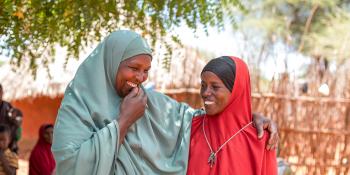
Annual report
Read our full annual report from 2023-24, and download reports from previous years.
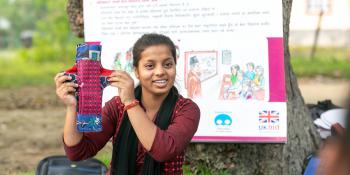
Our impact in health 2022/23
In 2022/23 we reached almost 90,000 people through our health projects. Our global health strategy aims to ensure that all adolescents and youth realise their rights to quality health and well-being. Find out more about our impact in health.
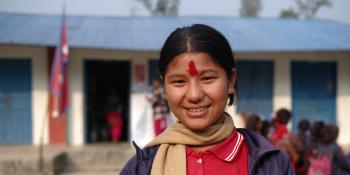
Our impact in education 2022/23
This year, around the world, VSO has made significant contributions to improving learning outcomes and recovering the learning losses that children have experienced because of the COVID-19 pandemic.
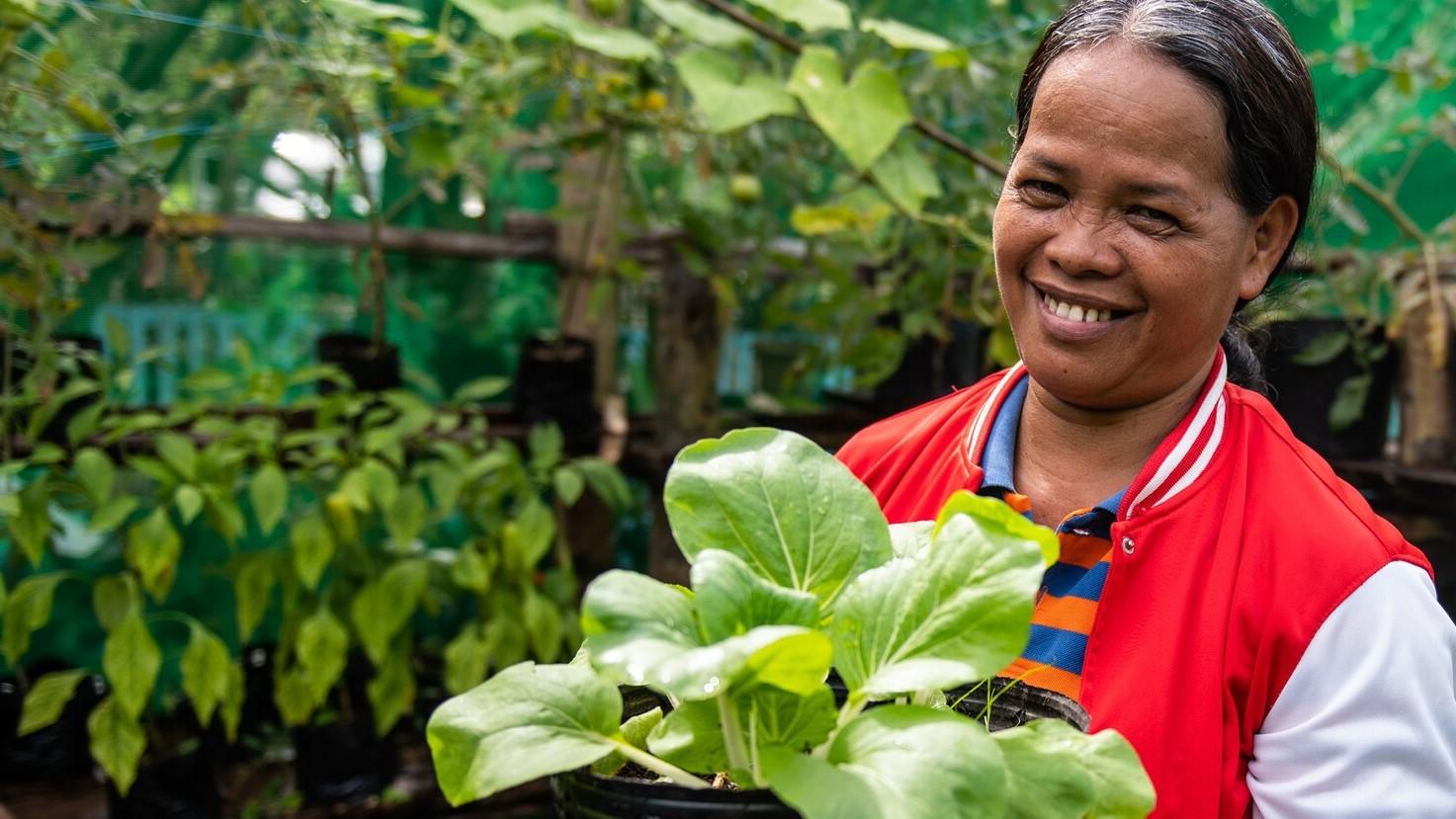
Support us with a donation
